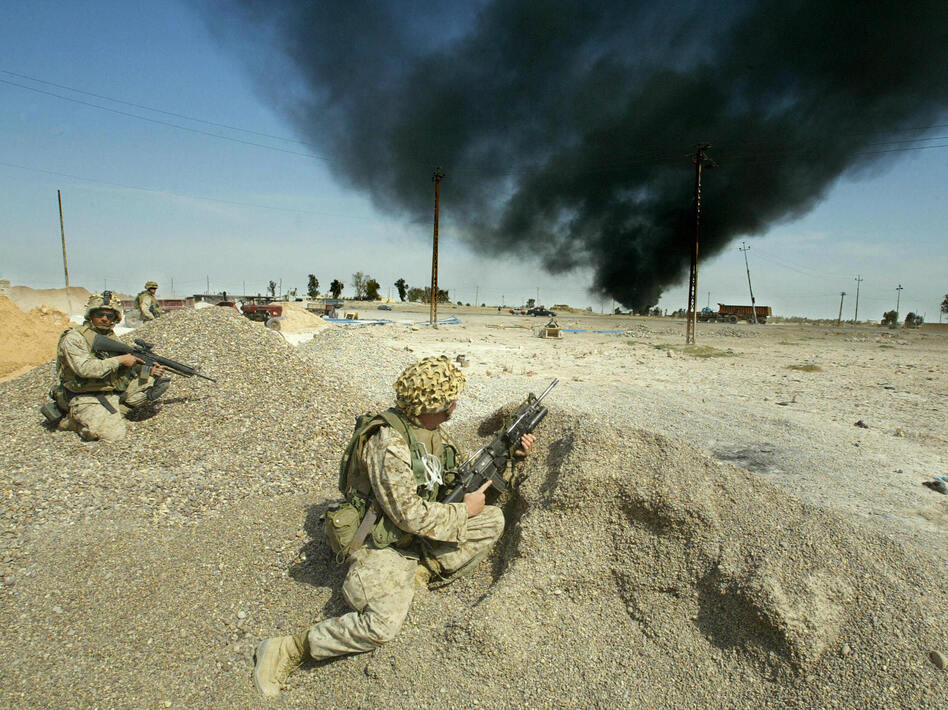Going to War may be contrary to our religious, moral and personal beliefs, yet, many of us in America felt the war on “terror” was justified by President Bush. Naturally,  Americans wanted revenge in Afghanistan, however, one year later, Bush was rallying the masses to support a war in Iraq… a nation that isn’t even next to Afghanistan or harboring Al Queda at the time. Yet, we were persuaded.
Americans wanted revenge in Afghanistan, however, one year later, Bush was rallying the masses to support a war in Iraq… a nation that isn’t even next to Afghanistan or harboring Al Queda at the time. Yet, we were persuaded.
We’re all familiar with pathos, logos, and ethos and how they play into persuasion. But there’s a deeper understanding of certain emotions that we should also learn about emotional appeals.
We need to learn more about Fear. More importantly, we should know how it is used to control us… simply because it is in fact, irrational. Aristotle said that arguments don’t have to be logical, they just have to seem that way. Much is invested in learning the general overview or appeals, and yeah, we all know how marketing tools are used to persuade us to buy something. But rarely does a company ‘trick’ us into buying something out of fear.
In my FREE book, I dissect a speech from former President Bush, analyzing three speech-tools that he used to persuade the people into going to war, or in other words, he made us FEAR the outcome if we did not first attack.
“All life has an original predisposition to good and a simultaneous propensity to evil” – Brad Evans

1. Us Versus Them Mentality
Fear appeals are best stated when the rhetor or, the speaker, offers the audience only two options, limiting them to the dichotomy, which some critics say may be unethical. Many of the scholars writing about this subject are bedeviled by the binary in war rhetoric, and there are probably more bodies of writing that talk about this than there have been presidents. For example, in “How an Elite-Engineered Moral Panic Led to the U.S. War on Iraq”, author Scott Bonn claims that Presidential Administrations are being manipulative and that President Bush aimed to “create fear, reinforce stereotypes, and exacerbate pre-existing divisions in the world” (228). These same pre-existing divisions are talked about in Brad Evans “Liberal War Thesis” as the “otherness to be the problem to be solved.”
2. The Deliberate Threat and Confidence
Not only does the audience have to know what to fear, but they must also be reassured that they will be victorious in battle, or able to overcome the pending fear. Philosopher Douglas N. Walton suggests that “only if the feasibility and ease of the recommended action outweigh the threat will the respondent be persuaded to take action.” In Walton’s study, “Practical Reasoning and the Structure of Fear Appeal Arguments” he is concerned with which appeals are successful in leading the audience to take the suggested action. Walton’s research uncovers that “when the [rhetor] uses the fear appeal argument, it [also] has to provide enough incentive to overcome [the threat’s] resistance”, meaning that after the fear has been spread, the rhetor must then give the audience enough confidence to overcome the threat mentioned by the speaker.
“[T]he violence of the new war rhetoric is less about the manipulation of individual psyches and more about the creation of a symbolic landscape” Engels and Saas
3. Sublime and/or the Collective Memory
In 1756 Edmund Burke asserted in Philosophical Enquiry into the Origin of our Ideas of the Sublime and Beautiful, that the sublime “is productive of the strongest emotion which the mind is capable of feeling”– and neuroscientists have recently found in their studies that there is in fact a section of the brain that becomes more active during times of being appealed to aesthetically.

Following up with the work on the Sublime presented by Edmund Burke, he wrote that the sublime encompasses fear to make his assertion about the strongest emotion, fear, and that the sublime “operates in a manner analogous to terror.” So how did the Bush administration use sublime rhetoric to strengthen his campaign in shaping the landscape from a beautiful horizon, into an uncertain region? Bush places locations and the enemy into an obscure category, because to “make anything very terrible, obscurity seems in general to be necessary.”






Leave a Reply